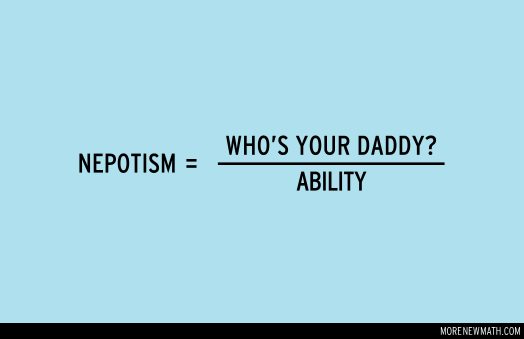From the people who brought you the original awareness test, comes a new version in the form of a Whodunnit mystery.
BONUS: Can you spot the difference the scene below?

– Found at Gif Bin.
From the people who brought you the original awareness test, comes a new version in the form of a Whodunnit mystery.
BONUS: Can you spot the difference the scene below?

– Found at Gif Bin.


Clever-clogs Craig Damrauer has created what he calls NEW MATH, a series of equations for some of life’s issues and questions.

This woman was hit by the a fast moving Renault as she attempted to take a better shot of the vehicle during a race. Thankfully only suffered a broken leg.
Honestly if there’s anything my private school education has taught me, it’s to stay the fuck away from racing rally cars.
See the video below.
Found at English Russia.

Now this is stroke of (evil) genius.
Created by Matt Braun and Jared Delorenzo, two students at University of the Arts in Philadelphia, the Biker’s Revenge is a pair of handlebar key plugs that will vandalize anyvehicle getting too close to your personal bike space.
Don’t try this on me though. You key my car, I’ll find you, like a bleeding dog in the snow ;)
More images after the jump.

Doobie, dope, roach, reefer, weed, Mary Jane, boom, splif, ganja – 10 common names for cannabis. Now here are the 10 common myths about Cannabis.
10. Fat Storage
Myth: Cannabis’ active ingredient THC gets stored in body fat and its effects can last days or even weeks.
Fact: It is true that cannabis (like many other drugs) enters the body’s fat stores, and it is for this reason that it can be detected long after use, but that is the only part of this myth which is true. The fact is, the psychoactive aspects of the stored cannabis are used up quickly and while the residue of the drug remains, it no longer has any effect on the person. Furthermore, the presence of THC in body fat is not harmful to the fat, the brain, or any other part of the body.
9. Memory Loss
Myth: Cannabis use causes memory loss and a general reduction in logic and intelligence.
Fact: This is another myth which has elements of truth to it – no doubt the reason it is believed by so many. Laboratory tests have shown that cannabis diminishes the short term memory – but only when a person is intoxicated with it. A person who has taken cannabis will be able to remember things learned before they took it but may have trouble learning new information during intoxication. There is no scientific evidence whatsoever to suggest that this can become a long-term or permanent problem when sober.
8. Scientific Proof
Myth: Cannabis has been scientifically proven to be harmful.
Fact: Let us start with a quote: “the smoking of cannabis, even long term, is not harmful to health.” This quote comes from the peer-reviewed British medical journal The Lancet (founded in 1823). There is certainly no scientific consensus on cannabis use, and certainly no scientific proof that casual use is dangerous to health.
Hit the jump for more myths or go to The List Universe.
This mockumentary details how the Japanese approach eating sushi from not asking the sushi chef about his dark personal history, to pouring beer the Samurai Way, to the geta that the sushi is served on (some people wear geta at home which is why many Japanese peoples’ feet smell of vinegar).
Click Play or go to Youtube.
– via A Welsh View.
I LOL’d.
– via Neatorama.
A handy guide for making you even more paranoid and distrustful of the people around you. Click image to see it bigger.
– via Reddit.
I’ve always thought hallucinations came at a price – drugs like LSD and mescaline aren’t cheap and I’m not arsed to pay for them. The Boston Globe, however, seems to think you can fling open the doors of perception without having to visit your local dealer.
Here are two simple tricks that mad scientists have thought up to tricking your brain into perceiving what we know isn’t real.

This trick involves using a radio and ping-pong balls. Turn on the radio and find a station playing static. Then lie down on a couch or bed and secure a pair of halved ping-pong balls over your eyes. You should experience some bizarre distortions within a few minutes. Hallucinations may vary from seeing horses prancing about in the clouds to hearing the voice of a dead relative.

This trick uses the newest painkiller on the market – inverted binoculars. Oxford University scientists have found out that test subjects looking at a wounded hand through the wrong end of the felt less pain and swelling. By making the hand appear smaller, the brain is tricked into reducing the bodily sensations of pain.
See more tricks to hack your brain at The Boston Globe – via Blame it on the Voices.